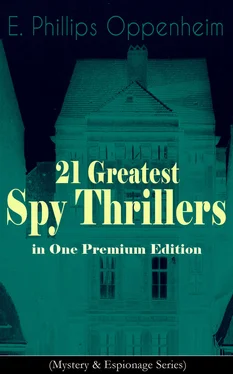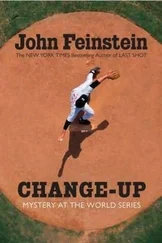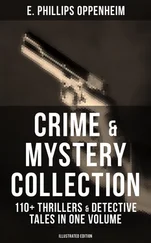“They may escape.”
“I have provided against that. There is a man at the door giving away copies of the menu. It is a very ordinary place, mein Herr . I pointed them out to him. I gave him a florin. He will give away no more menus. His eyes are fixed upon them. They will not leave the place.”
Charles took his seat in the taxi. It was a time when speed counted for nothing. In six or seven minutes they had passed into the outlying regions of the city. They pulled up with a jerk in front of a restaurant whose good days, if it had ever had any, had long since passed. There were two plate-glass windows, of which one was cracked and the other contained the remains of letters advertising a certain brand of beer. Inside there was an incredibly large number of marble-topped tables crowded with men and women mostly of the working-class type. The upper end of the establishment, obscured by a cloud of cigar smoke, was occupied by larger tables covered with soiled, coloured tablecloths. These were set against a semi-circle of divan seats with one or two cane-backed chairs, mostly in need of repair, facing them. There was half worn out cocoanut matting on the floor and a number of spittoons. The waiters, for the most part, wore a mixed garb consisting chiefly of black jerseys and dark-coloured trousers and aprons. Halfway up, the room branched to the right, and from the unseen portion came the strains of a violin. It was here that Charles came to a sudden standstill. Walking slowly down the passageway between the tables came a man with his eyes partially closed, playing, not altogether without skill, upon a wretched instrument, a version of the old Viennese waltz. He was a man of slightly below middle height who looked as though he had once been corpulent but had shrunken away through illness or starvation. He was dressed in a very shabby blue suit and there were deep lines in his face. It was only when he paused in front of a table, at which a girl was sitting alone clutching a saucer in her hand on which were a few copper coins, that Charles realized this was the end of his search. There was something unfamiliar in his throat. He was afraid to go on. A curious sense of shame almost kept him speechless. Then the music came to an end in the middle of a bar. Very slowly the musician’s arms descended until they hung straight down, the instrument in one hand, the bow in the other. He stared at Charles—quite speechless. The girl looked up. Charles had a horrible feeling that she was shaking the saucer at him. Then their eyes met and she gave a little cry. Every time he thought of that awful moment later in life he was thankful that her first expression was one of wonderful joy and it was only afterwards that the realization of their plight swept over her. It was Charles himself who made a gallant effort. He choked back down his throat that passionate outburst of dismayed sympathy. He even kept it from his tone. It was a heaven-directed impulse.
“Well, all I can say is,” he declared, taking both the girl’s hands in his, “thank God I have found you! Put that damn’ thing down and come and sit down here, Blute. Miss Grey—Patricia!”
She was sobbing quietly into her handkerchief. No one took any notice. They were accustomed to tears nowadays. Blute stumbled over the broken cane chair on the outside and sank on to the divan. Charles took them both by the arm and some kindly fate seemed to have sent a waiter within calling distance.
“Waiter,” Charles ordered. “Listen! I shall give you for your service—listen!—the biggest trinkgeld you ever had in your life. I have money—see,” he added, thrusting his hand into his pocket and bringing it out. “I want two bottles of the best wine you have in the place—Hungarian Carlowitz, if you have it. Something good, mind. Bring brandy, too—a bottle of brandy. Rolls and butter…Something to get us out of this place,” he explained to the other two in English, “until I can take you somewhere where we can eat.”
The waiter set down a tray he had been carrying and departed at a gentle run, pushing his way wherever he met with an obstacle, his senses dazed by the memory of that handful of money. Charles drew his protégés closer to him. Patricia had tried twice to speak but found it impossible.
“I know all about it without a word,” Charles said firmly. “There are hundreds just in the same plight—can’t get a schilling of cash in this damned country. I was very nearly in the same box myself. Luckily I have friends always in the hotels. I left some money with Herodin when I was here last and as I heard someone say the other day,” he went on, dropping his voice although indeed there was no one within hearing, “the Germans would elbow a Bishop on one side, but a famous hotel proprietor was always sacred.”
“It’s Mr. Charles!” Patricia gasped. “It’s Charles Mildenhall!”
“I know,” Blute said feebly. “I recognized him but I couldn’t speak. Day by day for months I have walked these streets looking for a friendly face and been scowled at by strangers. I’ve hung about the banks, I’ve argued at the tourist places. Charles Mildenhall, are you not afraid we shall murder you where you sit for that pocketful of money?”
“Write me your I.O.U.‘s, if you like,” Charles invited, drawing out notes from his pocket. “Oh, we can do all that later on. Here’s the wine. My God, that fellow’s a hustler! Thank heaven this is Vienna and not an English city. It’s good wine.”
The waiter’s hand was shaking so that he could scarcely draw the cork. Charles leaned over and took the bottle from him, reached to another table for a third glass and poured out three brimming tumblersful.
“The rolls,” he said. “You’re a bright fellow, I can see,” he went on, as the man began to beam upon them. “Never mind about the butter. Rolls.”
They came. Cheese came. Delicatessen followed. Butter that was eatable made its appearance. Neither of the two made the slightest hesitation about proving to their host the horrible truth—they were starving. He ate bread himself—coarse bread—and found it delicious. He had no need to be polite about the wine. It was good. Patricia set down her tumbler half empty. Already a little colour was flushing her cheeks.
“Go steady with the rolls,” Charles advised them both. “I shall carry you away from this place for dinner.”
“Dinner,” the girl faltered. “Just say that over again, Mr. Mildenhall. Dinner—something that smells good, perhaps!”
“ Schnitzel à la Viennoise “ he said light-heartedly, “in my private sitting-room at Sacher’s. How will that go with you, Blute?”
Blute had a roll in either hand. He put one down and took a long draught of wine. For the first time he spoke coherently. He jerked out the words. They spelled their own tragedy.
“I have been in prison for six months,” he groaned. “Towards the end of it we ate the filth the warders refused.”
Charles would have nothing to do with sympathy. He nodded as though Blute’s was quite an ordinary confidence.
“Hard luck! I just escaped prison myself this time. The world’s gone mad,” he added, patting Blute’s back and taking a fervent grip of Patricia’s hand. “Never mind. Thank heaven Fritz and I found the right place!”
“You were looking for us?” she asked eagerly.
“I should jolly well think I was,” he answered. “You don’t suppose I dropped in here to have a light meal, I hope? I knew things must have gone terribly for you when I discovered all about the currency restrictions, that Mr. Benjamin had completely disappeared and Dr. Schwarz was in prison. You see, I did my best to trace you. Don’t bother to tell me all about it yet. We must start another chapter of living again. Just get the ugly things out of your minds. A cigarette each? There we are! Now I’m the only conversationalist. I’m running this show. I’ve a taxi-cab outside. I take you under my charge. I’m taking you to the back entrance of my hotel—the manager loves me so much that he would give it to me if I asked him! By a route which I know quite well you will come with me to my sitting-room. I guarantee that within a few minutes of arriving there we shall be safely enclosed from any intruder.”
Читать дальше












